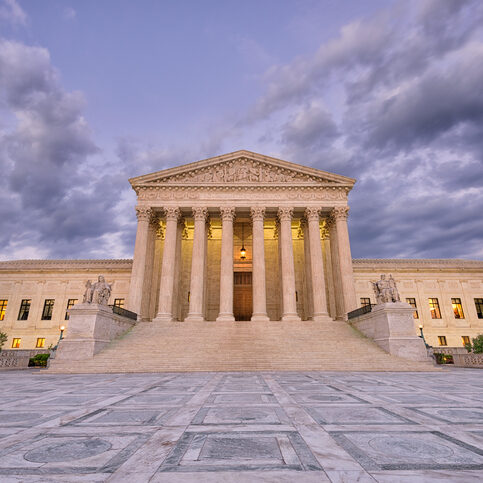Insights < BACK TO ALL INSIGHTS
Chevron Overruling Sparks Regulatory Uncertainty Across Industries
FEATURED
July 10, 2024
Chevron Overruling Sparks Regulatory Uncertainty Across Industries
By: Jake Gray
A landmark decision by the Supreme Court overruled 40-year precedent that provided the bedrock for modern federal agency rulemaking and administration. In Loper Bright Enterprises v. Raimondo (2024), alongside its companion case Relentless, Inc. v. Department of Commerce, the Supreme Court overruled Chevron U.S.A. Inc. v. Natural Resources Defense Council, Inc. (1984), holding that deference to an agency’s interpretation of the statute is inconsistent with both the Administrative Procedure Act (APA) and the judiciary’s function in interpreting statutes and determining questions of the law. The decision commences an era of potential regulatory uncertainty with broad implications for many industries regulated by the federal government and its agencies, while also formalizing what the Court noted as an existing tendency to selectively…
What are you looking for?
Ready, Set, Go: More States Adopt Privacy Laws
July 8, 2024
Ready, Set, Go: More States Adopt Privacy Laws
By: Nicole Kardell
Note the below chart was updated on July 8, 2024 to reflect recent developments. The number of U.S. states that have adopted privacy laws grows regularly. Fortunately, there seems to be quite a bit of crossover, at least when it comes to thresholds that companies must meet in order to trigger compliance requirements. We provide below a chart that summarizes these thresholds by state, including…
The Supreme Court Strips Nonconsensual Release Power from Bankruptcy Courts
June 28, 2024
The Supreme Court Strips Nonconsensual Release Power from Bankruptcy Courts
By: George Calhoun
In a divided 5-4 decision, the Supreme Court held yesterday that “the bankruptcy code does not authorize a release and injunction that, as part of a plan of reorganization under Chapter 11, effectively seek to discharge claims against a non-debtor without the consent of affected claimants.” Harrington v. Purdue Pharma, L.P., __ U.S. __ (2024). Although there is a long history of nonconsensual third-party releases…
Ticketmaster’s Cruel Summer – the potential implications of a DOJ lawsuit against the ticketing platform and why concert fans may not be out of the woods yet.
The FTC Kills Noncompetes
April 30, 2024
The FTC Kills Noncompetes
By: George Calhoun
In a groundbreaking move that will reshape the workplace and many litigation practices nationwide, the FTC has issued a final rule that effectively bans all employee non-compete clauses. Approximately 30 million Americans currently work under a non-compete clause. All but a few applicable to senior executives will be void upon the effective date of the rule. After the rule is effective, no new non-compete clauses…
Ad-Tech Europe: The Moving Target Marking Targeted Advertising
April 26, 2024
Ad-Tech Europe: The Moving Target Marking Targeted Advertising
By: Nicole Kardell
The European Data Protection Board (“EDPB”) recently published an opinion on the legality of pay-or-consent models for online platforms offering services in Europe. While the opinion is non-binding and limited to “large online platforms[1],” companies that offer platforms large and small in Europe should pay attention to the EDPB’s analysis—it will inform their future guidance for entities large and small. The upshot: Pay-or-consent models [for…
Social Media Networks’ Section 230 Immunity on the Chopping Block? New York Court Allows Claims to Proceed Stemming from Buffalo Shooting
April 1, 2024
Social Media Networks’ Section 230 Immunity on the Chopping Block? New York Court Allows Claims to Proceed Stemming from Buffalo Shooting
By: Michelle Cohen
Since 1996, Internet platforms and social media companies have relied on a federal law, Section 230 of the Communications Decency Act, to protect them from liability for civil law claims stemming from content on their platforms. As the influence of platforms like Facebook, Twitter (now X), and others has grown, members of Congress, consumer groups, and other stakeholders have urged Congress to restrict or repeal…
OpenAI’s Legal Troubles Mount as New York Times Lawsuit Escalates Alongside SEC Investigation
March 4, 2024
OpenAI’s Legal Troubles Mount as New York Times Lawsuit Escalates Alongside SEC Investigation
By: Jake Gray
On February 28th, 2024, the Wall Street Journal reported that the Securities and Exchange Commission (”SEC”) is investigating OpenAI’s internal communications following the board’s ousting and re-introduction of OpenAI CEO Sam Altman in November 2023. Importantly, the SEC’s scrutiny of OpenAI adds to the mounting legal and regulatory challenges faced by the company. As rationale for Altman’s expulsion, the board cryptically stated that Altman hadn’t…
Ding Dong – The Police Want Access to Your Doorbell Footage. Can They Get It?
February 16, 2024
Ding Dong – The Police Want Access to Your Doorbell Footage. Can They Get It?
By: Abbey Block
The popular electronic doorbell company, Ring, recently announced a change to its policy of sharing doorbell footage with law enforcement agencies. In a blog post, the company, which is owned by Amazon, revealed it will sunset the “Request for Assistance” tool, which allowed law enforcement agencies to request and access users’ doorbell footage through Ring’s “Neighbors” App. Ring’s electronic doorbells are utilized by an estimated…





